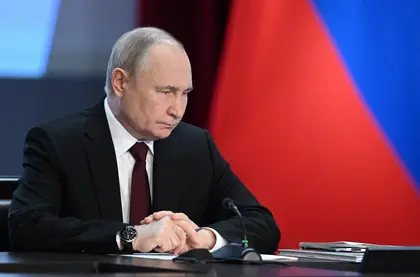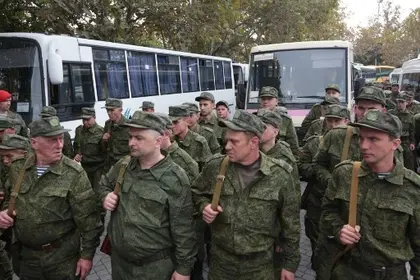A bronze statue of the founder of the Wagner private military company, Yevgeny Prigozhin, was revealed adjoining his grave in the Porokhovskoye cemetery in St. Petersburg on Saturday, June 1 – which would have been his 63rd birthday. The mercenary leader died in a suspicious plane crash in August 2023, two months after he led an unsuccessful mutiny against the Russian authorities.
According to Russian social media dozens of supporters of the billionaire businessman, civilians as well as fighters in uniforms bearing the Wagner insignia their faces covered, paused to pay their respects. Some placed bouquets of flowers or posed for photographs beside his effigy which depicts him standing in his familiar aggressive stance.
JOIN US ON TELEGRAM
Follow our coverage of the war on the @Kyivpost_official.
Prigozhin made his not inconsiderate fortune in the early 2000s having secured contracts to supply food to the Russian army and to the Kremlin, a role that earned him the nickname “Putin’s Chef.” He founded the Wagner mercenary group in 2014, which was initially given a free hand to take on Moscow's covert (and not so-covert) operations in Africa and the Middle East before being tasked to fight on the front in Ukraine following the full-scale invasion in February 2022.
Once close to Russian President Vladimir Putin and his Defense Minister Sergei Shoigu, Prigozhin fell out of favor after publicly accusing Russia's military commanders of incompetence and corruption. This culminated with him ordering his men to march on Moscow in June 2023, during which his forces took control of Russian army headquarters in Rostov and shot down at least one helicopter and an Ilyushin Il-22M airborne command-center aircraft.

Ukraine Says Moscow Struck IDP Shelter in Russia’s Kursk
Prigozhin and his fighters abandoned his rebellion, apparently after mediation by Belarusian President Alexander Lukashenko. Despite its apparent peaceful ending and public statements by Putin that all was forgiven Prigozhin was killed by a mid-air explosion on his private aircraft over Russia’s Tver Oblast en route from Moscow to St. Petersburg.
Despite the Kremlin’s denial of involvement in the incident, it was strongly suspected to be the regime’s revenge. Following his death Putin publicly called Prigozhin a “talented” person who, unfortunately had committed “mistakes.”
Since then, Wagner has been restructured with many of its fighters being integrated into regular Russian forces, other PMCs or “retired.”
For several months in the center of Moscow, following his death, an improvised memorial was placed near the Kremlin in honor of Prigozhin and his deputy Dmitry Utkin, who also died in the plane crash.
A permanent memorial the two was also erected outside the “Wagner church” in the town of Goryachy Klyuch in Russia’s Krasnodar region, in April.
Some consider that the firing of Shoigu in mid-May, who for over a decade had been a close ally of Putin, and the arrest of several high-ranking officers on corruption charges, belatedly validated the accusations Prigozhin had made against management of the war in Ukraine.
You can also highlight the text and press Ctrl + Enter










